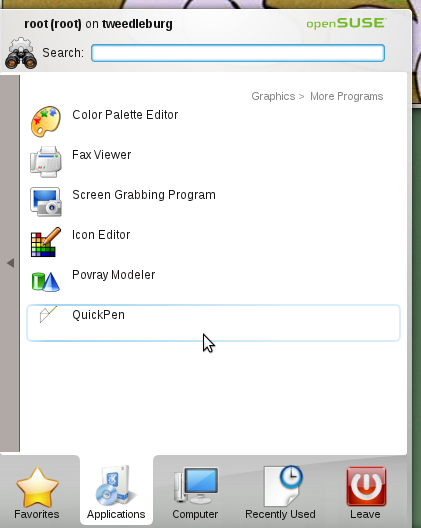Development/Tutorials/Desktop File
| Tutorial Series | Basics |
| Previous | |
| What's Next | |
| Further Reading | the .desktop Free Desktop Spec; |
Desktop File
In order for your application to show up in menus and/or to be automatically associated with mime types in file browsers, you need to provide a .desktop file like follows:
[Desktop Entry]
Type=Application
Exec=your-app %u
MimeType=application/x-your-mime-type;
Icon=some-icon
X-DocPath=yourapp/index.html
Terminal=false
Name=Your App
GenericName=Some Generic Name
Comment=Short Description Of Your App
Categories=Qt;KDE;
Take a look at the .desktop Free Desktop Spec to find our more about the key/value pairs above. It's important to pick a good set of Categories, see the spec for a list of valid values.
Your project
You want your project to show up in the K Menu like this:
In this example, the application is called quickpen and it shows up in the category "Graphics". To accomplish that in your project you need to take care the .desktop file is distributed to the appropriate place.
qmake based projects
In case you are working on a qmake based project, add the following to your .pro file:
target.path = /usr/local/bin desktop.path = /usr/share/applications desktop.files += your-app.desktop
INSTALLS += target desktop
Note that the bold strings above should be in your project anyway.
An example .pro file can be found here. The related .desktop file can be found here.
cmake based projects
In case you are working on a cmake based project, add an install directive to your CMakeLists.txt file like this:
install( PROGRAMS your-app.desktop DESTINATION ${XDG_APPS_INSTALL_DIR} )
An example CMakeLists.txt file can be found here. The corresponding .desktop file is here.

